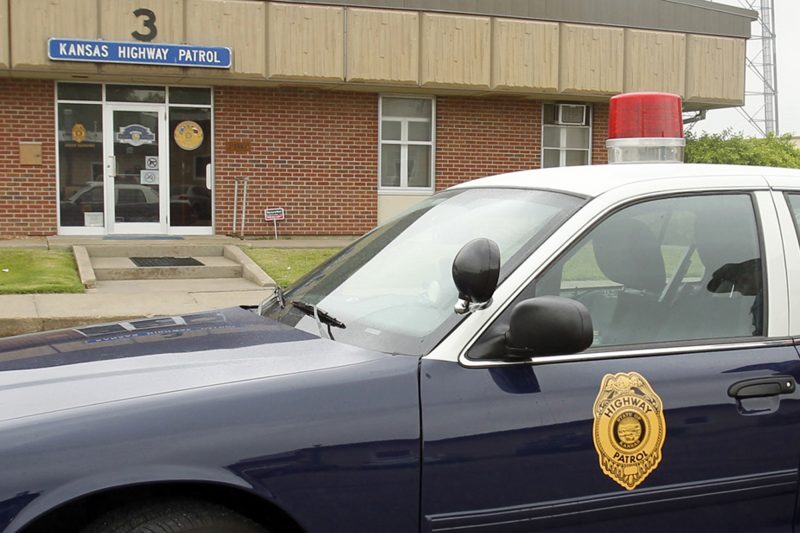Joshua Bosire was driving home along Interstate 70 in Kansas on a cold February night in 2019 when he was pulled over by Highway Patrol for speeding. The 35-year-old aviation engineer was returning from Denver after celebrating his daughter’s birthday.
Kansas trooper Brandon McMillan pulled Bosire over for driving seven miles per hour over the speed limit, according to court documents. The trooper did not issue a speeding ticket, but he suspected Bosire, who is Black, was trafficking drugs from Colorado, where marijuana is legal, to Kansas, where it is not.
What happened next is an example of a policing practice known as the Kansas “two step,” a tactic that a judge ruled unconstitutional this week because routine traffic stops were being used to detain motorists whom troopers suspected of transporting drugs.
The Kansas trooper returned to his vehicle, called for backup and struck up a new conversation with Bosire in an attempt to prolong the traffic stop, according to court documents. When McMillan eventually asked whether he could search Bosire’s vehicle, Bosire declined. The trooper then called in a K-9 unit.
Highway patrol didn’t find any evidence of drugs, and Bosire was released after being detained for nearly an hour.
But Bosire, who said in court documents that McMillan racially profiled him that night, now lives in fear of law enforcement. He said the encounter destroyed his trust in the police.
“I sleep with a gun next to my bed. I drive with cameras recording,” he said. “I don’t travel at night, because I am scared of what law enforcement people can do to me.”
Bosire is one of five motorists — detained by state troopers between 2017 and 2019 — to argue that the Kansas Highway Patrol violated their Fourth Amendment right against unreasonable search and seizure.
On Friday, a federal judge agreed.
U.S. District Judge Kathryn H. Vratil ruled Friday that the practice of detaining motorists with out-of-state license plates on I-70, particularly those from Colorado and Missouri, to search for drugs is unconstitutional and a violation of a 10th Circuit ruling that prohibits state troopers from detaining motorists based on their out-of-state residency, travel origin or destination.
In her 79-page opinion, Vratil wrote that the police unit waged a “war on motorists” in the “name of drug interdiction.”
“As wars go, this one is relatively easy; it’s simple and cheap, and for motorists, it’s not a fair fight,” said Vratil, who was appointed by President George H.W. Bush. “The war is basically a question of numbers: Stop enough cars and you’re bound to discover drugs. And what’s the harm if a few constitutional rights are trampled along the way?”
“As a result, all drivers on I-70 have moving targets on their backs,” Vratil said.
The ACLU of Kansas, which sued the highway patrol of behalf of Bosire and the other motorists, welcomed the ruling.
“This is a huge win — for our clients and for anyone else who travels on Kansas highways,” Sharon Brett, legal director of the ACLU of Kansas, said in a statement. “Today’s decision validates that motorists’ constitutional rights cannot be cast aside under the guise of a ‘war on drugs.’”
“It also demonstrates that courts will not tolerate the cowboy mentality of policing that subjects our citizens to conditions of humiliation, degradation, and, in some tragic cases, violence,” she added.
“When we give police the power to conduct these pretextual stops, assume people to be drug traffickers, and use flimsy justifications to get inside their vehicles to prolong traffic stops, we turn what should be a simple ticket-release scenario into something longer, fraught, and complicated,” Brett said.
The Kansas Highway Patrol did not respond to requests for comment Saturday morning.
Friday’s ruling follows similar judgments by two juries in cases against individual officers this year. In late April, a jury found that McMillan violated Bosire’s Fourth Amendment rights during the 2019 stop and awarded Bosire $40,000 in damages. A separate jury awarded motorist Blaine Shaw $1 after finding that Trooper Douglas Schulte had violated Shaw’s rights during a 2017 stop.
The latest case before Vratil challenged the Kansas Highway Patrol’s overall policing policy.
The plaintiffs and defendants have until mid-August to respond to the terms of Vratil’s injunction, which includes requiring troopers to document all stops, detentions and searches. It also requires them to tell motorists that they can refuse or revoke consent to search at any time.





























